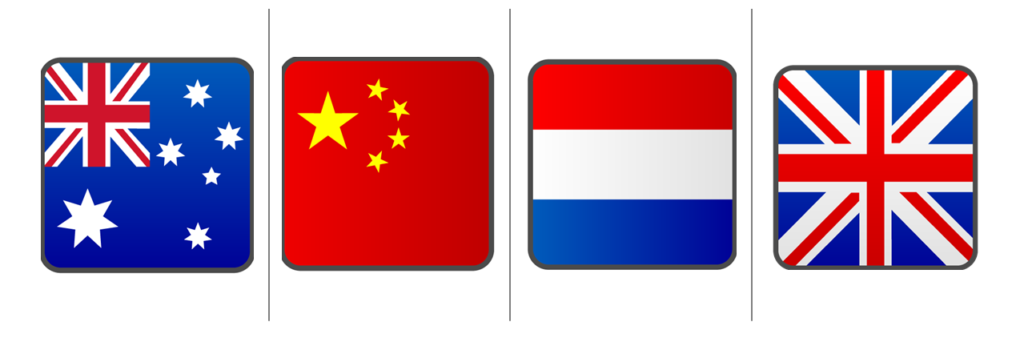
One of the themes of my research on Australia Day is identity – particularly racial and national identity.
Not so long ago I came across what was for me, a very relatable article on a beauty website entitled What Looking Racially Ambiguous Taught Me About Privilege and Identity (byrdie.com) by Ariane Resnick.
I’m a first generation born Australian. Like the author Ariane, I’ve spent my adult life confronted by a combination of questions on the one hand and assumptions on the other (in one case bordering on belligerent certainty), about my national and racial heritage. While the majority of those that ask seem genuinely more curious than anything, I am inevitably faced with a recurring sense of uncertainty followed by a bout of contemplation about my appearance and my identity. While I am happy to explain that my mother’s ancestral heritage is 3/4 Chinese and 1/4 English (having a Chinese father and a 1/2 Chinese 1/2 English mother) and my father’s is Dutch, I more often have to start by setting people straight about not being a Kiwi or of Pacific Islander descent – not even close I always think – but usually responding with something like a laugh and a comment such as ‘no I’m not a New Zealander I’m Eurasian – but I get that a lot so don’t worry you’re not alone‘ – something to put them at ease… These days I follow this up with a ‘not that there’s anything wrong with that‘ qualifying quote from Seinfeld!
On occasion I’ve mentioned this semi-regular misconception to a New Zealand native. ‘I’m often mistaken for being one of your fellow compatriots‘ I say… at times I’ve had a visibly quizzical or even offended physical reaction, followed by a comment along the lines of ‘I can’t see why‘ – apparently I’m nothing like them! So, while I’m trying to smooth over the awkwardness others are experiencing about who I am or am not, does anyone stop to think about how I feel about their sense of my otherness and how this affects me?
Where do I fit in? Where do I belong?
I’m sometimes left to wonder – how am I being perceived more generally by people I encounter beyond my work, educational and social circles? For example, by the people I pass on the street and the front-line workers, those I encounter on a one-time basis for example at the shops, in airports, on public transport? How do they see me, judge me, make assumptions about who I am, what I am, where I fit in or might even be questioning whether I’m Australian? I’ve never thought of myself as anything else but based on these questions I’m clearly seen as “other” whether that is here in Australia, or overseas.
While there are those who might consider us racially ambiguous people as exotic and intriguing, no doubt there are others who consider us as impure and alien. According to my mother, one of my father’s relatives once commented that their children would look like Pekingese dogs. This may have been in the late 1960s or early 1970s but have attitudes fully evolved since then? A white male acquaintance with Eurasian children of his own once quipped that I was a “mongrel” just like his kids. I probably laughed a little awkwardly and said something like “charming”. Whether I said it out loud or whispered it under my breath I don’t recall.
More recently I introduced my parents to someone in my local community whom I engage with almost daily. I said these are my parents and he said ‘yeah, I figured‘. Dad proceeded to say something about how I could be mistaken for being Hawaiian… this person’s somewhat naive response was ‘na na all good… I already knew she was a half caste‘. Eeek! Once upon a time I’m sure this would have been deeply offensive to my mother but sadly, she has early-stage Alzheimer’s and as such I’m not sure she fully comprehends a lot of what is said in her presence these days – perhaps that’s a small blessing.
In considering the significance of Australia Day I cannot help feeling like a third wheel in the current debate. On the one side we have our First Nations people who understandably feel excluded by Australia Day’s association with January 26th, the date of arrival of the First Fleet which brought with it 200 years of exclusion and suffering for Indigenous peoples and culture. On the other side there remains the still dominant attitude that…
British settlement was a very good thing – it wasn’t good immediately for everyone. But the modern Australia that emerged from British settlement … is something that all of us, on balance, can and should be proud of.
Australia Day: Tony Abbott says British settlement ‘a very good thing’ | Australia news | The Guardian
I’m not indigenous but nor am I Anglo-Australian. I guess again that puts me in the “others” category.
Due to the actions and decisions of generations now past, I speak only one language and know very very little of the cultural customs of my ancestors. Australia is my nation but one that continues to remain divided in so many ways. To me Australia Day will remain a divisive and politically charged event until such time as we acknowledge our past and make a genuine effort to represent all our people – to treat everyone with respect and compassion. I hope that one day we can establish a subconscious sense of equality as Australia’s citizens, regardless of our heritage and our differences.
I hope that my research will make some contribution to helping to facilitate the conversations that need to occur for us to truly one day become a united nation.

